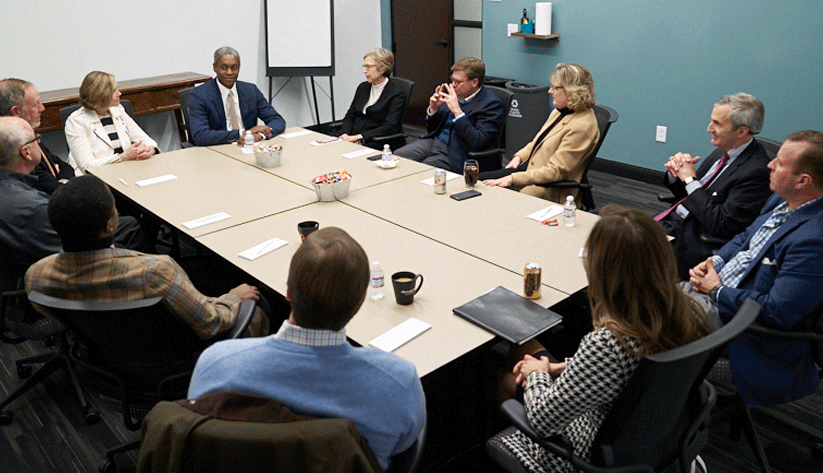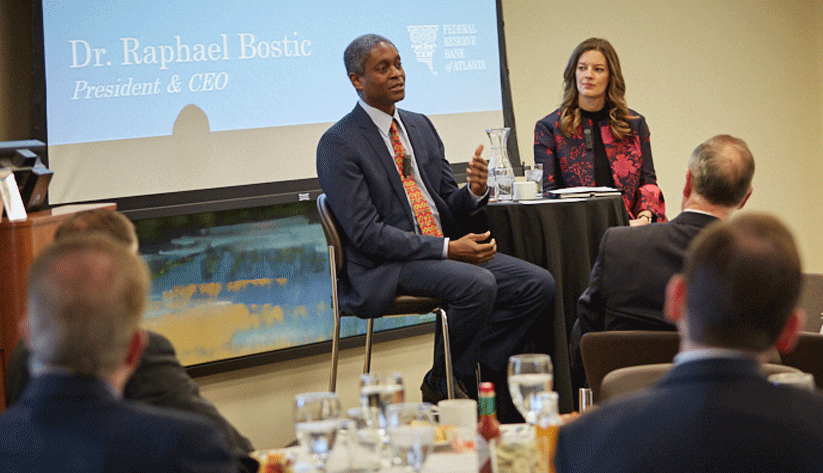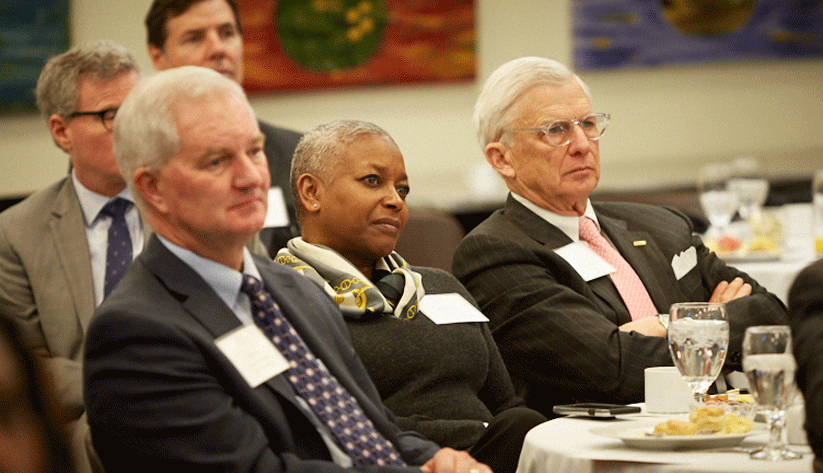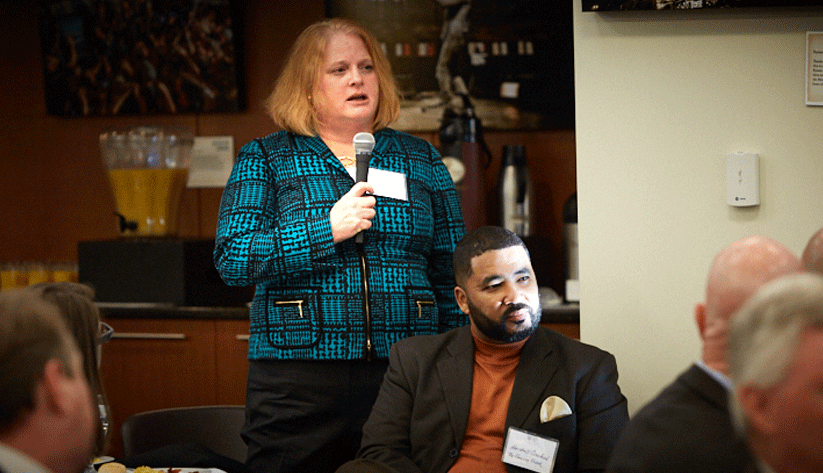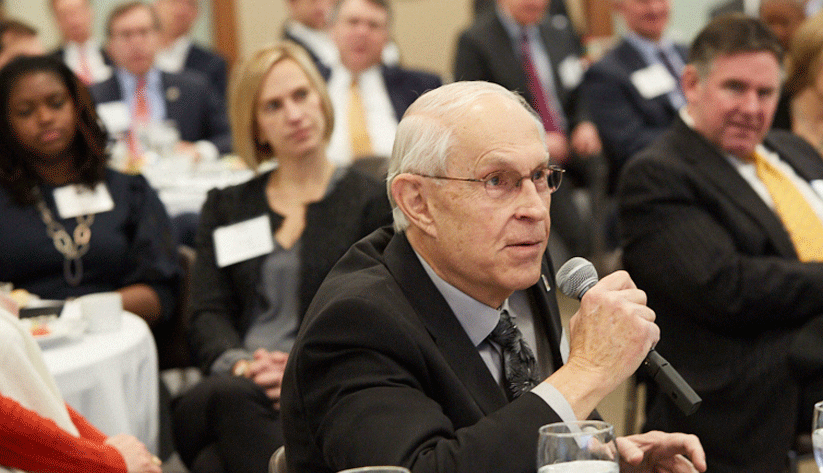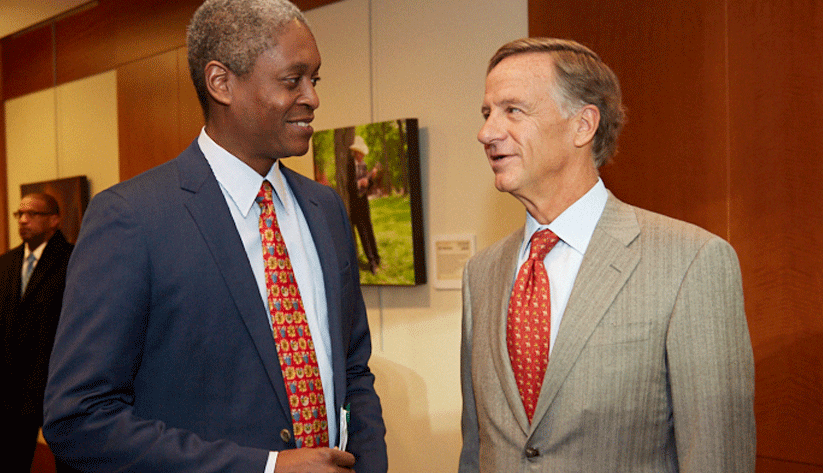
Atlanta Fed president Raphael Bostic with Tennessee governor Bill Haslam. Photo by David Fine
Atlanta Fed president Raphael Bostic continued his tour of the Southeast's major cities, making a recent stop in Nashville to meet a who's who of government and business leaders. Bostic saw a city teeming with growth and confidence but also contemplating the challenges of its expansion.
"I was struck by how strong the Nashville economy is currently performing," Bostic said. "There is robust job growth, the unemployment rate is well below the national average, and my meetings revealed a business vitality, optimism, and energy that suggest these trends are likely to continue."
Not just Music City anymore
Site of the Country Music Hall of Fame and Grand Ole Opry, Nashville has grown beyond its music roots. Its population has surged and a flood of companies has relocated to the city in the past decade. The city is a national health care hub, and innovation in that arena has helped drive growth. Professional and business services and the leisure and hospitality sectors have also fueled much of the employment increases in Nashville since the end of the recession, according to data from Moody's Analytics.
Bostic went to the Tennessee capital in mid-January to visit the Atlanta Fed's branch there. He had lunch with the presidents of Fisk and Middle Tennessee State universities; discussed demographic trends and changes in consumer behavior with Todd Vasos, the chief executive of discount retailer Dollar General; met one on one with Nashville mayor Megan Barry; and talked about the importance of expanding access to education with Tennessee governor Bill Haslam.
"Governor Haslam and Mayor Barry both were quite bullish on Nashville and Tennessee more broadly," Bostic said. "They both pointed to a positive environment for business and a strong civic community philosophy as reasons they believe expansion will continue."
Questions posed on a range of pressing matters
During a forum before an audience of roughly 80 business, nonprofit, and public sector leaders, Bostic took questions on issues such as income inequality, the outlook for economic growth, cybersecurity, and Federal Reserve Board leadership. Noting the key objectives for monetary policy to maximize employment and stabilize prices, Bostic also discussed why the Fed works to understand issues that may disproportionately affect lower-income households.
"He was particularly interested in the challenges facing Nashville because of the very rapid growth it is experiencing," said Lee Jones, an Atlanta Fed vice president and the regional executive at the Nashville Branch.
For example, Bostic broached the topic of affordable housing, saying its scarcity could stress workers and hurt productivity, eventually affecting the economy.
In Nashville, areas close to downtown are being redeveloped with higher-priced housing, Jones said. Where do the people who are being displaced go?
Laurel Graefe, an Atlanta Fed assistant vice president and the deputy regional executive at the Nashville Branch, said Middle Tennessee leaders "are taking a hard look at the relationship between housing affordability, access to transportation, and the geographic nature of job creation as the city plots its path for future growth. President Bostic's comments drove home why the Fed is keeping a close eye on those same issues as it seeks to understand the changing dynamics of today's economy."
Graefe cited data from a housing report from the Nashville mayor's office indicating that nearly a quarter of the city's homeowners and almost half of its renters are cost-burdened, meaning they are paying more than 30 percent of their income on housing. The city has lost more than 20 percent of its affordable housing supply since the year 2000.
Bostic is a voting member of the policymaking Federal Open Market Committee this year. The Atlanta Fed president, whose research spans fields including home ownership and housing finance, identified other challenges resulting from Nashville's growth.
"Traffic and congestion have increased markedly in the Nashville metro area and could become a drag on growth if not addressed in a way that reduces the burdens of moving people and goods," he said.
Bostic cited a risk that new and growing companies in the region could face worker shortages. "This makes quality education and workforce development—two issues of focus for us at the Atlanta Fed—high priorities for making sure that people are not the barrier that prevents growth from occurring more expansively."





